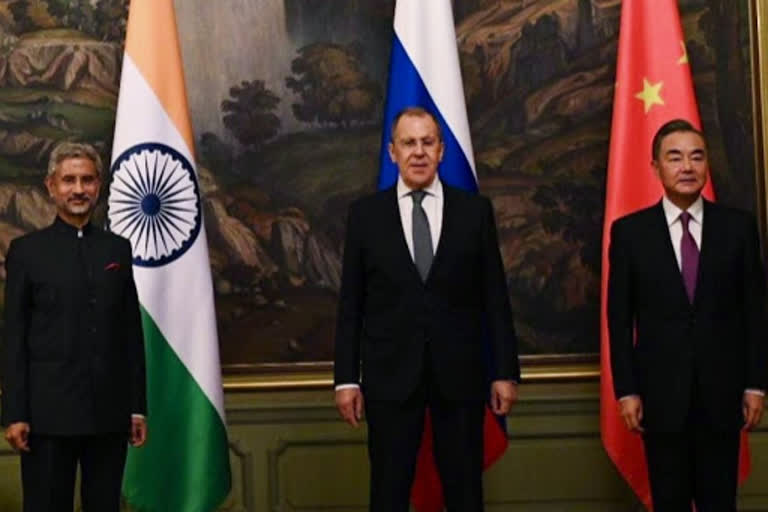New Delhi: With palpable military tension between India and China since April-May 2020 and the abject failure of almost all existing consultative mechanisms to resolve the crisis, the critical importance of the meeting between the foreign ministers of India and China on the sidelines of the SCO meeting in Moscow on Thursday evening could not have been overstated.
Among other things it could curtail the rising chances of an armed conflict between the nuclear-armed Asian giants which would have obvious global implications and dissipate the gathering war clouds.
In this backdrop, if one reads between the lines, the joint statement that emanated from Moscow after the Thursday evening meeting and the process that preceded it is replete with implications other than the plain declaration of pious intentions.
SCALING UP OF TALKS
One, the buck now stops at the tables of the top political leaderships. ETV Bharat had written on August 20: "Other than the Modi-Xi mechanism right at the top, there is reason to believe that all the other mechanisms have been tried, tested, and they have failed."
In fact, given the intractable nature of India-China border issues, which in a way is also a legacy of a colonial past, just military level or diplomatic interventions will simply not do. Only the highest offices of both countries have the necessary wherewithal and mandate to resolve the longstanding issue.
Read: Dependence on China not built overnight, will take yrs to decouple: R Gandhi
The present state of affairs on the LAC is because of the failure of the Jawaharlal Nehru-Chou en Lai, respective PMs of India and China in the late 50s. When that failed, the 1962 war was the fallout.
That is why the very first point of the joint statement states that the two sides should follow the important consensus reached by the leaders of the two countries. One can very well expect summit-level talks between PM Narendra Modi and President Xi Jinping in the coming days in a continuance of the Wuhan and Mamallapuram 'informal' spirit.
RISE OF RUSSIA
Second, the claim of a strategic mediating space by Russia is very much evident. It means a huge rise in Russia's prestige among the comity of nations of the world.
Read: India's top defence officials review China border row
On the sidelines of the SCO meet and in the course of just the last few days, India and China's defence and foreign ministers have met and broken the ice. And interestingly, it has all happened in Moscow.
This is taking place amid US President Donald Trump's unsolicited offers to mediate. While the offer has been rebuffed by China, India has pretended to politely ignore it.
Coming on the backdrop of mediating roles elsewhere in the global arena, the Russian effort may be part of a conscious plan to regain the lost glory after the collapse of the Soviet Union (USSR).
'QUAD' QUANDARY
Thirdly, India's tacit acceptance to talk to China under the Moscow sun may be a dampener for the much-touted 'Quad' formation which is already under pressure after Japanese PM Shinzo Abe's shock resignation. Abe was a strong proponent for the 'Quad'. And formative troubles for 'Quad' would have deep implications on developments in the Indo-Pacific region.
Read: India to China: Massive PLA deployment along LAC 'flash points'
Doubts over 'Quad' also arise because of Australia's deep dependence on China to market its dairy and agriculture products.
IRAN ANGLE
Fourthly, Indian defence minister Rajnath Singh and foreign minister S Jaishankar's brief stopovers at Iran's Tehran have not failed to raise eyebrows. In effect, questions are being raised as to whether India is eyeing a policy shift. Because with the US presidential elections in November, there is a possibility that the sanctions against Iran may not be as vehement in case Trump loses.
Since last year, the traditional close ties between Indian and Iran had taken a tumble largely because of India adhering to the diktat of sanctions on Iran by the US. In response, Iran had virulently criticised India on its Kashmir policy.
Read: 'India's talks in Tehran on bilateral, regional matters'
Trouble with Iran has resulted in obstacles for Indian involvement in the strategic Chabahar port which would have offered India direct trade access to Afghanistan and Central Asia.
To sum up, the India-China negotiations in Russia besides dissipating the chances of an armed conflict between the two most populous nations on earth may also be a harbinger of changing geopolitical strategies of many important nations of the world.



